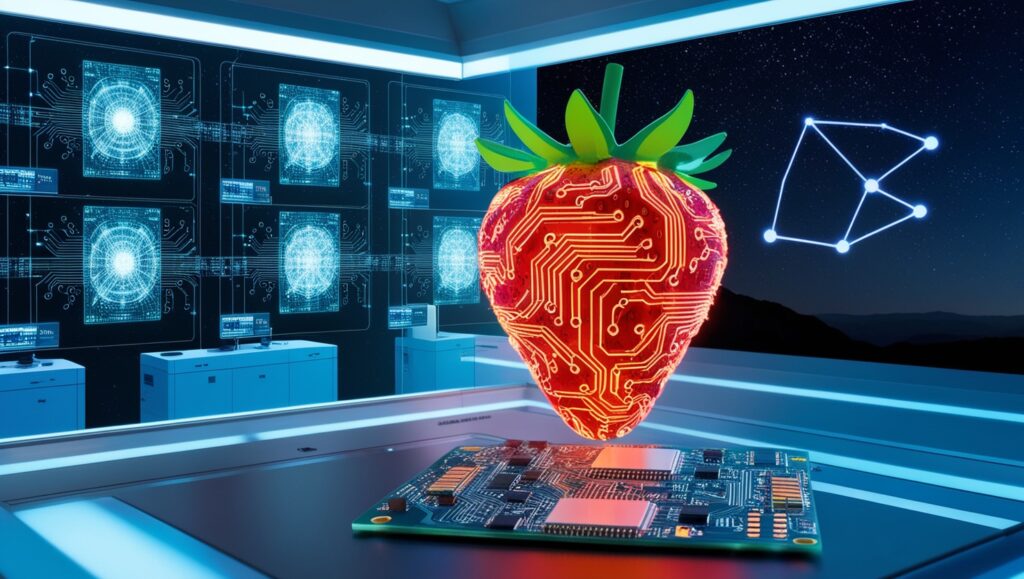OpenAI’s Strawberry and Orion models represent a significant leap in AI capabilities. Strawberry demonstrates advanced reasoning abilities, and Orion leverages this power to generate high-quality synthetic training data. These developments herald a new era in AI, potentially leading to models that transcend human-level intelligence in specific domains while raising important questions about AI safety, ethics, and national security implications.
1. Introduction to Strawberry and Orion
OpenAI, a leading artificial intelligence research laboratory, has recently made headlines with the revelation of two groundbreaking AI models: Strawberry and Orion. These models represent a significant leap forward in AI capabilities, particularly in reasoning and self-improvement.
1.1 The Strawberry Model
Strawberry, previously known as Q* (Q-Star), is an advanced AI model that has garnered attention from national security agencies. This model demonstrates exceptional reasoning abilities and has the potential to solve complex problems that have traditionally been challenging for AI systems.
1.2 The Orion Model
Orion is OpenAI’s next-generation large language model, which is currently in development. What sets Orion apart is its unique approach to training and improvement, utilizing the capabilities of the Strawberry model to generate high-quality synthetic data.
2. The Technology Behind Strawberry and Orion
The foundation of these models lies in advanced AI techniques that enable self-improvement and enhanced reasoning capabilities.
2.1 Self-Taught Reasoner (STaR)
At the core of Strawberry’s capabilities is the Self-Taught Reasoner (STaR) technique. Developed by researchers at Stanford University, including Noah D. Goodman, STaR allows AI models to bootstrap themselves into higher intelligence levels by iteratively creating their training data.
2.2 Synthetic Data Generation
Orion leverages Strawberry’s advanced reasoning capabilities to generate high-quality, tailored synthetic data. This approach allows for creating smaller, more efficient models that can outperform larger counterparts in specific tasks.
3. Implications for AI Development and National Security
The emergence of Strawberry and Orion has far-reaching implications for both AI development and national security.
3.1 Potential for Superintelligence
According to Noah Goodman, the STaR technique could potentially enable language models to transcend human-level intelligence. This prospect raises significant questions about AI’s future role in society and its potential challenges.
3.2 National Security Concerns
OpenAI has reportedly demonstrated Strawberry to U.S. national security officials, highlighting the growing intersection between advanced AI technologies and national security interests. This interaction suggests a move towards closer collaboration between AI developers and government agencies in managing potential risks and opportunities.
4. The Future of AI Model Development
The Strawberry and Orion models represent a shift in how AI models are developed and deployed.
4.1 Continuous Learning Loop
Unlike traditional AI models with distinct training and inference phases, these new models blur the line between training and output. This continuous learning loop allows for ongoing improvement and adaptation.
4.2 Specialized Expert Models
The development of Orion suggests a future where large, powerful models like Strawberry are used to create smaller, highly specialized “expert” models for specific tasks. This approach could lead to more efficient and targeted AI applications across various domains.
5. Ethical and Safety Considerations
The development of such advanced AI models raises important ethical and safety considerations.
5.1 AI Safety Measures
As these models approach or potentially surpass human-level intelligence in certain domains, ensuring their safe and responsible use becomes paramount. This may involve new frameworks for AI governance and safety protocols.
5.2 Access and Control
The potential power of models like Strawberry and Orion raises questions about who should have access to such technologies and how they should be controlled. This could lead to new paradigms in AI deployment, where the most advanced models are kept secure while more specialized, task-specific models are made publicly available.
6. Conclusion
OpenAI’s Strawberry and Orion models represent a significant milestone in AI development. As these technologies evolve, they promise to reshape our understanding of artificial intelligence and its societal role. However, they also present new challenges requiring careful consideration and collaboration between technologists, policymakers, and ethicists to navigate responsibly.
The journey of AI from narrow, task-specific applications to potentially superintelligent systems is unfolding rapidly. As we stand on the brink of this new era, we must approach these developments with both excitement for their potential and caution for their implications.
7. For More
For more on the Self-Taught Reasoner, read the STaR: Bootstrapping Reasoning With Reasoning paper. Also, read the Reuters Article Exclusive: OpenAI working on new reasoning technology under code name ‘Strawberry’.



